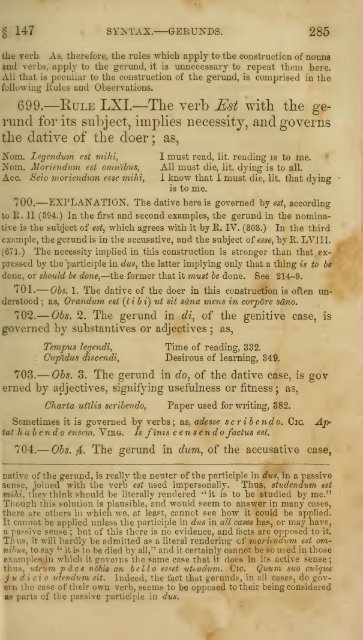The principles of Latin grammar; comprising the ... - Essan.org
The principles of Latin grammar; comprising the ... - Essan.org
The principles of Latin grammar; comprising the ... - Essan.org
- No tags were found...
Create successful ePaper yourself
Turn your PDF publications into a flip-book with our unique Google optimized e-Paper software.
§ 147 SYNTAX.—GERUNDS. 285<strong>the</strong> verb.As, <strong>the</strong>refore, <strong>the</strong> rules which apply to <strong>the</strong> construction <strong>of</strong> nounsunci verbs, apply to <strong>the</strong> gerund, it is unnecessary to repeat <strong>the</strong>m here.All that is peculiar to <strong>the</strong> construction <strong>of</strong> <strong>the</strong> gerund, is comprised in <strong>the</strong>following Rules and Observations.699.—Rule LXL—<strong>The</strong> verb Est with <strong>the</strong> gerundfor its subject, implies necessity, and governs<strong>the</strong> dative <strong>of</strong> <strong>the</strong> doer ; as,Kom. Legendum est mihi, I must read, lit. reading is to me.Noin. Moriendum est omnibus, All must die, lit. dying is to all.Ace. Scio moriendum esse mihi, I know that I must die, lit. that dyingis to me.700.—EXPLANATION. <strong>The</strong> dative here is governed by est, accordingto R. II (894.) In <strong>the</strong> first and second examples, <strong>the</strong> gerund in <strong>the</strong> nominativeis <strong>the</strong> subject <strong>of</strong> est, which agrees with it by E. IV. (303.) In <strong>the</strong> thirdexample, <strong>the</strong> gerund is in <strong>the</strong> accusative, and <strong>the</strong> subject <strong>of</strong> esse, by E. LVIII.(671.) <strong>The</strong> necessity implied in this construction is stronger than that expressedby <strong>the</strong> participle in dus, <strong>the</strong> latter implying only that a thiug is to bedone, or should be done,—<strong>the</strong> former that it must be done. See 214-9.701.— Obs. 1. <strong>The</strong> dative <strong>of</strong> <strong>the</strong> doer in this construction is <strong>of</strong>ten understood; as, Orandum est (ti bi) ut sit sdna mens in corpore sdno.702.— Obs. 2. <strong>The</strong> gerund in di, <strong>of</strong> <strong>the</strong> genitive case, isgoverned by substantives or adjectives ;as,Tempus legendi, Time <strong>of</strong> reading, 332.Cupidus discendi, Desirous <strong>of</strong> learning, 349.703.— Obs. 3. <strong>The</strong> gerund in do, <strong>of</strong> <strong>the</strong> dative case, is governed by adjectives, signifying usefulness or fitness ; as,Charta utilis scribendo, Paper used for writing, 382.Sometimes it is governed by verbs; as, adesse scribendo. Cic. Ap*tat habendo ensem. Virg. Is finis censendo /actus est.704.— Obs. fi.<strong>The</strong> gerund in dura, <strong>of</strong> <strong>the</strong> accusative case,native <strong>of</strong> <strong>the</strong> gerund, is really <strong>the</strong> neuter <strong>of</strong> <strong>the</strong> participle in dus, in a passivesense, joined with <strong>the</strong> verb est used impersonally. Thus, studendum estmihi, <strong>the</strong>y think should be literally rendered kt it is to be studied by me."Though this solution is plausible, and would seem to answer in many cases,<strong>the</strong>re are o<strong>the</strong>rs in which we. at least, cannot see how it could be applied.It cannot be applied unless <strong>the</strong> participle in dus in all cases has, or may have,a passive sense ;but <strong>of</strong> this <strong>the</strong>re is no evidence, and facts are opposed to it.Thus, it will hardly be admitted as a literal rendering <strong>of</strong> moriendum est omnibus,to say " it is to be died by all," and it certainly cannot be so used in thoseexamples in which it governs <strong>the</strong> same case that it does in its active sense;thus, vtrum pace nobis an bello esset utendvm. Cic. Quum suo culquej u d i c i o utendvm sit. Indeed, <strong>the</strong> fact that gerunds, in all cases, do govern<strong>the</strong> case <strong>of</strong> <strong>the</strong>ir own verb, seems to be opposed to <strong>the</strong>ir being consideredas parts <strong>of</strong> <strong>the</strong> passive participle in dus.
















